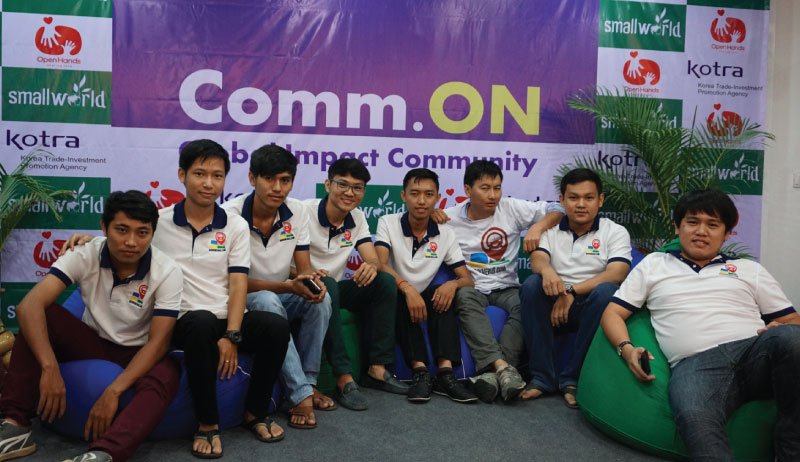
Join Cambodian fast growing startup and innovate Cambodian travel industry!
BookMeBus
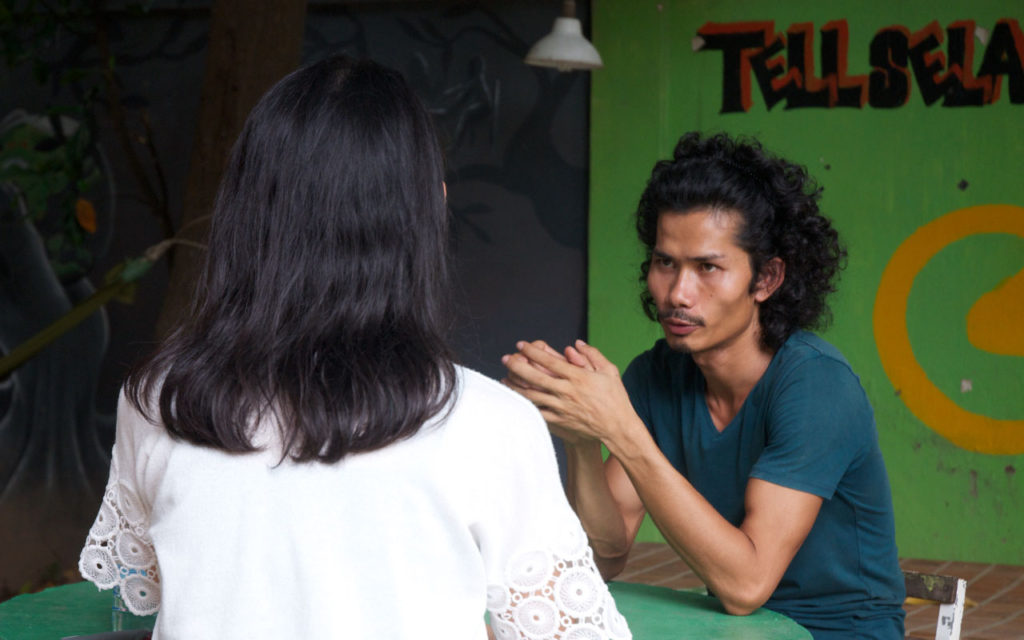
No one can talk about startups in Cambodia without speaking of this man -Rithy Thul-, a 30-year-old passionate about promoting small business startup in Cambodia, who once lost almost everything when he was 17. “Afro, macho, minimalist, bicycle and hammock lover…”, this is how people would describe him. As an interviewer and a friend of Rithy, I have to say that these characteristics are quite accurate.
Establishing the first co-working space run by Cambodian in Phnom Penh, Rithy is now engaged with a great variety of pioneering activities in the country such as bitcoin, decentralized monetary system, and investment for startup companies.
Why has he become interested in funding other’s business? What is his sense of value for money? And what was his early life experience that made him today’s Rithy, the central figure of Cambodian startups, and the seed funder for hundreds of today’s successful ventures?
Yusi: Could you tell us something about your main business, SmallWorld?
Rithy: SmallWorld is a shared space which helps entrepreneurs to test, refine, design startup model, build and launch fast with small capital and with like-minded people. We build a startup community by providing office address and co-working environment for entrepreneurs. Most teams are early startups or people who want to find a partner to work with. We are the second co-working space in Cambodia, but the first one that is initiated by Cambodians and being open like this.
For me, helping people realize their dreams is a part of the things that I want to do. But I don’t want to become a guru that people just come to. I want to become a “background” to enable their dreams to happen through a set of programs or a supporting platform.
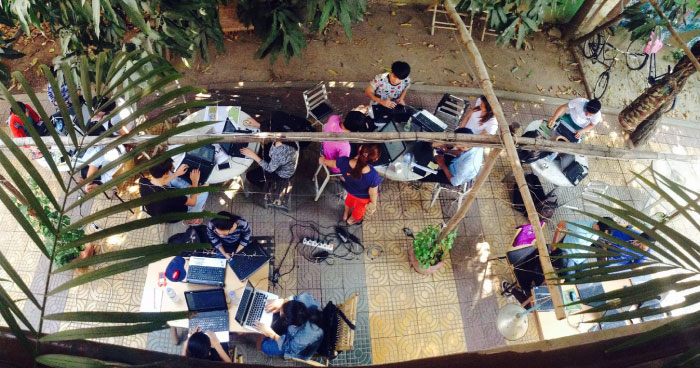
SmallWorld supports entrepreneurs to move forward
Many people are impressed by what you are doing now. But what kind of childhood did you have?
It seems to impress some people, but I’m just doing what I need to survive and what I want to do. I was born in a village named Sa-ang district near Phnom Penh, a village with only a population of 6,000. I worked on our farm, took care of the house, lived on trees, and that was great. (Though my father was quite strict) Then I went to high school where I had a lot of dreams. It was the coolest time in my life except I didn’t have much money in my pocket all the time.
What happened?
My mom used to give me some money, but it was just the way I spent was crazy. I never had enough money to do what I wanted to do. Then I graduated from my high school and moved to Phnom Penh for college. I quitted after two years and three months because it didn’t fit me. Education at school is good for a lot of other people but it wasn’t for me. After that, I had nothing to do but trying to be active. I didn’t take money from my parents anymore so I had to find my own ways to make some bucks here and there. Though my biggest purpose wasn’t making money. I just needed to get by and receive an education from my experience.
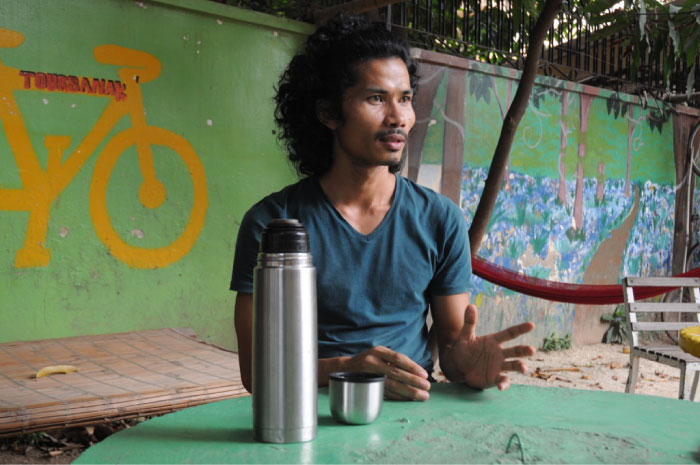
“Problems drove me”, Rithy said.
What did you major in college?
English. It opened a lot of doors for me. I can learn from the Internet because I know English, otherwise, I wouldn’t come this far.
I lived in a pagoda after coming to Phnom Penh. Sometimes I became homesick, but I didn’t give up because I didn’t want to do the same thing I used to do at home. I started reading, and it was my biggest learning at that period.
At the same time, I gradually became more comfortable with living in the pagoda, but one thing I didn’t like was to see people who came to Phnom Penh and still live in the pagoda even at their 50s. They were staying in their comfort zone. When I looked at those people, I thought that “I can’t do this”. I wanted to do business, but I was just an English student and there was no way for me to get there.
What did you do?
I read some books and did my first business in 2006, and that was a crack. I lost all of my money. I had three hundred dollars myself and borrowed 1000 dollars to start while only earning 50 dollars a month at that time. So if I had to pay them the money back, It would have taken me at least two years, without eating. So, I just forgot who I owed the money and said something like “ok, I will pay you back one day”. Haha
Then I took my bike adventure only with a dollar and 20 cents in my bank account because I felt very low. On my way, I met a cyclist from America, who learned about me and wanted to help. He gave me 100 dollars and told me to go to study computer.
How did you feel when someone sympathized and gave you money?
It was great, but I didn’t really appreciate at that time because 100 dollars still wasn’t enough to pay back my 1000 dollar debt. But it was so generous of him. He went back to America but we are still in touch. I found what I want to do after the cycling trip, I wanted to earn my money back through the Internet because I lost them through the Internet. In 2007, I suddenly started making money from 50 USD a month to 50 USD a day just by organizing meetings for investors and holding a consultation for expats, which I learned from and after the cycling trip. Nobody in Cambodia knew enough English, computer, the Internet, and how to broadcast themselves online at that time. I just put some advertisement for selling and renting properties, and those investors and expats would find me. They hired me to do feasibility studies and to talk to the government. I made my money through the commission fees.
Though my English was quite bad then. Sometimes I would look back my e-mail history and wonder how those people could trust me at all. Haha I didn’t know what to do when I lost all of my money, but there’s always the bouncing part. I didn’t consider it as a failure. Even now, every time when we run out of money to do something, I aways think back how I could survive with no money at all seven or eight years ago.
What made you feel positive about this experience?
Because I have done it. It happened to me and I experienced it. Actually, money isn’t that special. I found that it’s just a psychology. If we give too much power to money, we’ll be trapped in always thinking about making money. But if you think money as a tool, you’ll realize that money is not that important itself and we’ll never have enough money to do whatever things we want.
Did you also have any negative thoughts when you lost your investment?
Of course. But it wasn’t about myself that I couldn’t make money. It was about how and why I started trusting people. I developed a sense of critical analyzation on people who I work with and do business with, and learned to read more about people’s behavior before getting involved. I lost a lot of money but also saved a lot of time.
You are doing really a lot of things, but what’s your biggest goal?
I want to create a tree community in a jungle where has mountains, waterfalls, a place to ride on horses, playing arrows, and hanging a hammock on the tree. I always say that I want to buy 300 hectares of jungle land and protect the forest. It’s just coming from my selfish idea. I just want to live in the forest with fresh air to breath and natural food to eat, but it happened to go along with protecting the environment. I think it’s very healthy, self-sufficient, and protecting ourselves from some greedy people.
If I grew a forest now, a crazy greedy guy who wants to build a hotel could just come and kick me out with his bodyguard. But if I have 1000 successful entrepreneurs on my side and invite them to come just by sending an email, we will be more powerful to convey our message and protect the forest. That’s actually my idea to protect myself. I want to invest in at least 1000 businesses (to create a network to protect ourselves from some dark power). My investment is still very small in terms of size for seed funding (10,000-20,000 USD). I hope I can use technology to solve financial problems and decentralize the control in Cambodia.
When I was in high school though, I was very motivated to study science, automation, and electronics. I wanted to make machines and bicycles that can fly, and make a renewable energy from recycled water. I talked a lot about these ideas before but nobody was interested. I haven’t achieved this dream yet but it’s always in my head. I think most of the things I’m doing now will respond to my dreams one day. I can feel that I’m getting closer and closer to them.
You are really not persistent about money.
Money certainly can do a lot of things these days. But money can be in a different form. It could be the nature. People would be craving for nature and that’s a different type of money. Money is cash in our time, but money in the future could be the information we have, and it’s already so.
What’s the most popular way for people to get information in Cambodia?
Facebook. I would like to teach people how to use Google and stop them from using Facebook. Facebook shows the news feeds while Google only gives you what you search for. You only select what you want. I started googling from 2006, like “how to become a billionaire”, “how to be a philosopher”, “how to be a scientist”, “how to be more efficient” etc… How to be any “how to be”. There was a time that I would print out and read any “how to be” on the internet. I think I spent about 100 dollars a month to use the Internet and printing.
“How to be any ‘how to be'” sounds like “To be or not to be (by Shakespeare)”.
Many people know so many things, but they don’t know how to use them. Maybe they are shy to speak out, afraid to implement, not having enough courage to step forward, give up before they succeed, or they just have too much pride. Most of the time, people hit the wall and fail. But the same failure often happens to be the ground stair to get a step higher.
I also think there’s something wrong with teaching people nowadays. Trainers, motivational speakers, or someone who tells “keep looking for your passion! Do the things you love!”. But to do the things you love you just need to do it. You will realize that to look for a thing is a waste of time along with your ways because you only get it when you get it. If you have a dream of achieving something, then you work towards it and get it somehow someday. But looking for ways to do things right is not going to be right. I think it’s a wrong thing to tell people to “keep looking for” or “meet people who can give you inspiration”. You don’t get inspiration by just talking with people. You gain more interests and excitement by doing things. You meet people through this process, and you will only find a mentor when you feel your personalities fit. I met a lot of rich people and I’m ok to be friends with them. But it’s another thing when you chose people to share your ideas and dream. I only do it with people who I think “I want to be like them when I age”. This kind of match is valuable to keep looking for in other people.
Achieving something requires time, too. It took me five years to come here. The community wasn’t ready, the more we pushed the more we got negative feedbacks, and we spent too much money on wrong targets. Then we became more flexible. Time is the only resource and the most valuable thing that allows us to do whatever things we want to do.
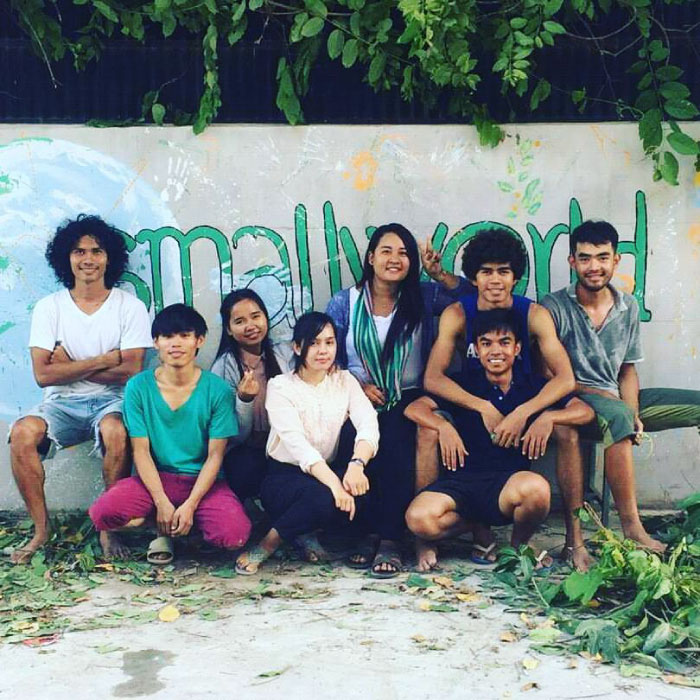
It took Rithy five years to make his SmallWorld big.
I would say, focus on what you can do that would bridge you to what you want to do. You cannot be what you want to be without doing what you can do now. Whatever knowledge or capability that can lift yourself up, use it. If you want to own a business but don’t have money, you may still have some knowledge in collecting information and that helps you to find companies that will pay you for the information, which would be your strength.
Sometimes people confuse with being strong and feeling strong. Strength is something you can do now and what other people need you. You don’t always have to be strong. But to feel strong and not to afraid of losing is valuable because if you throw out your pride and be naked, you don’t need a big house to be happy, you don’t need more money to live, and you will not fear failure to do the things you want to do. I wouldn’t feel ashamed if I have to close SmallWorld tomorrow. I wouldn’t feel it as a misery because I know I can start again. If you throw your attachment and harness your knowledge, you will be free.
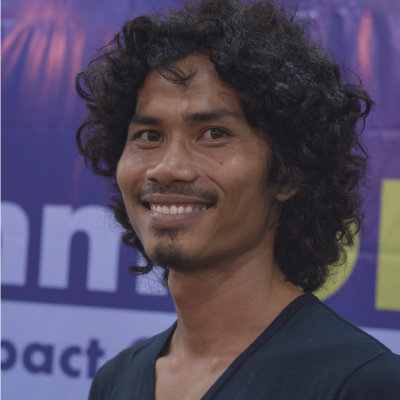
Rithy Thul, Founder of SmallWorld
Born in Sa-ang district, Kandal Province, Rithy came out to Phnom Penh for college just like many other Cambodian students. His real adventure started when he fell into a 1000 USD debt from the failure of his first business at the age of 17. Today, he does not only earned his money back but also turned to an investor who has been funding hundreds of Cambodian startup companies since 2011. He has interests in automation, electronics, computer science and currently decentralized monetary system. His biggest dream is to buy a jungle land and stay on his hammock on the tree while being connected with thousand of successful entrepreneurs who are also nature lovers.
SmallWorld, founded by Rithy and his team in 2011, is a co-working space which helps entrepreneurs to test, refine, design startup model, build and launch fast with small capital, and meet like-minded people.
Work with Cambodian Entreprener
Work with Visionary Entreprener